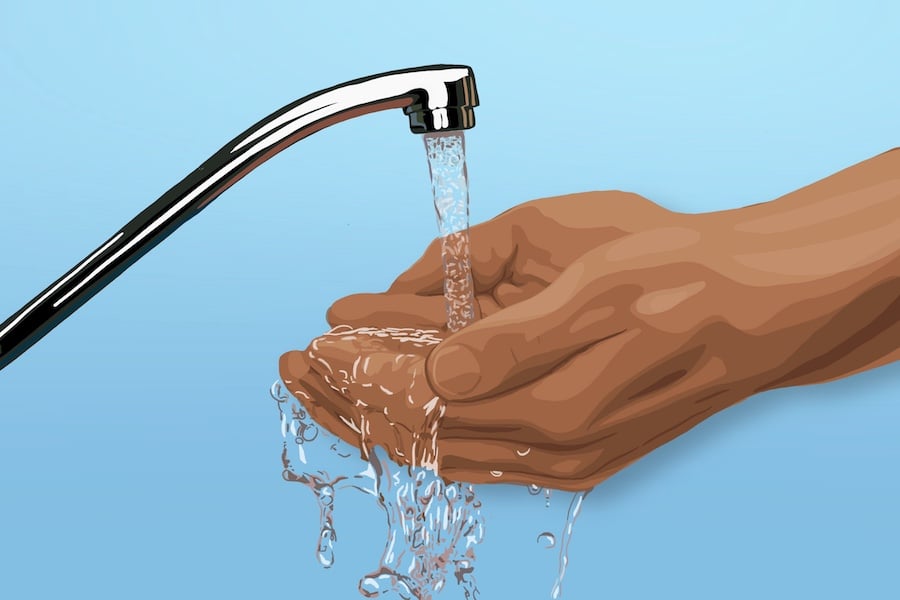‘We Are Water’ Project assesses Evanstonians’ relationship with water
October 8, 2020
When Clare Tallon Ruen worked with students in Evanston/Skokie School District 65 to teach kids about water in their community, she said she encountered a lot of misconceptions about Lake Michigan. Some students thought the lake was an ocean. Others thought there were sharks in it.
Tallon Ruen said she saw this as an overall misunderstanding of the lake she sees as central to the community, which sparked her interest in residents’ self-identification with Lake Michigan. In March, the Evanston Community Foundation approved a grant for the Watershed Collective, started by Tallon Ruen in 2016, to explore just that: community members’ relationship with their water.
The project, called “We Are Water,” is run by Tallon Ruen, Liliana Hernandez Gonzales, an Environmental Engineering graduate student at Northwestern, and Vidya Venkataramanan, a postdoctoral fellow in the University’s Department of Anthropology. The team has completed the first phase of the project, a survey distributed across the community asking residents questions about the safety of drinking water, flooding concerns, infrastructure and more.
The goal, Hernandez Gonzales said, is to give city officials insight into residents’ priorities when it comes to water.
“If I’m a city official, I could be doing something that I think is important, but maybe that’s not what the resident thinks is important, or what they need,” Hernandez Gonzales “It will give the city and everyone a better understanding of what is happening.”
Hernandez Gonzales said the team distributed the survey to over 620 residents, from all wards, ages and races. The group also provided forms in both English and Spanish. However, she noted the majority of survey responses are from older, White members of the community.
The We Are Water team will now analyze survey results and move to the second phase of the project, which involves interviewing community members to understand residents’ responses and potential trends. In this stage, Hernandez Gonzales said they will try to interview people from a wide range of backgrounds and demographics.
So far, survey results show around half of residents surveyed treat their tap water in some way, by filtering it, for example, which indicates to Tallon Ruen that at least half of residents don’t trust their water. Tallon Ruen said she wants to change this by educating the community about the city’s water and in doing so, increase residents’ connection with and appreciation for Lake Michigan. She said she sees Evanston’s water as safe, and thinks the public works department is well-run. According to the Water Utility Report, Evanston’s drinking water was deemed safe last year.
“This isn’t for granted that we have this body of water at all,” Tallon Ruen said. “It’s a one time gift of the glaciers. Many different countries at many different times have tried to buy it.”
If the community builds a stronger identity with the lake, Tallon Ruen said residents will be more cognizant of where Evanston’s water goes and how it is used, and can also reduce the likelihood of privatization of the city’s water source in the future, if the city were in a bind for money.
Richard Lanyon, Evanston resident and member of the Watershed Collective, said one of the reasons he moved to Evanston was because of the lake. He said he appreciates residents’ access to “this source of clean water at (their) doorstep,” but public education about the water filtration and cycling process is important.
“A lot of people take water for granted,” Lanyon said. “We open the tap and the clean water is there. You don’t think about where it comes from… People should know more about that and give it more thought.”
Hernandez Gonzales said in the survey, people also expressed concern about lead pipes, aging infrastructure, rising lake levels and, since the start of the pandemic, concerns about water shut-offs. Darrell King, Evanston’s water production bureau chief, said residents don’t need to worry about water shut-offs because the city has implemented a moratorium on water shut-offs until April 2021.
Through Connections for the Homeless, the team also interviewed people experiencing homelessness, who shared their difficulties with accessing water to drink and bathe. Tallon Ruen said the city can provide more safe public water fountains and bathrooms to increase water access.
The team plans to complete the project by spring of next year, when they hope to publish a report to provide city officials.
Email: [email protected]
Twitter: @delaneygnelson
Related Stories:
— Lincolnwood completes construction project connecting to Evanston water supply
— McCormick sophomore Saahir Ganti-Agrawal conducts water purification research on nanofiltration membranes
— Northwestern researchers hope to democratize drinking water tests through ROSALIND


